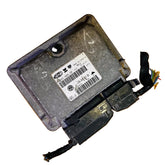How to Identify a Faulty Car Transmission Control Module (TCM) – Signs, Diagnosis & Solutions
Introduction
The Transmission Control Module (TCM) is one of the most critical electronic control units in modern cars. It communicates with the Engine Control Unit (ECU), sensors, and other electrical parts to ensure smooth gear shifting, fuel efficiency, and overall driving performance.
When the TCM becomes faulty, your car can experience serious performance issues. In this blog, we’ll cover how to identify a failing TCM, why electrical parts are essential for performance, and how upgrading or replacing them can restore your car’s reliability.
What is a Transmission Control Module (TCM)?
The TCM is an automotive electronic control unit that manages gear shifting in automatic transmissions. It ensures gears change at the right time by processing signals from:
-
Engine Control Unit (ECU) – regulates engine performance.
-
Throttle Position Sensor – monitors acceleration.
-
Speed Sensors – track wheel and transmission speed.
-
Solenoids – control the flow of transmission fluid.
Together, these electrical modules create a smooth driving experience, reduce fuel consumption, and prevent transmission damage.
Signs of a Faulty Transmission Control Module
-
Check Engine or Transmission Warning Light
-
A failing TCM will trigger dashboard warning lights.
-
OBD-II scanners often show TCM-related error codes.
-
-
Hard or Erratic Gear Shifts
-
If your car jerks, slips, or hesitates when shifting, the TCM may be malfunctioning.
-
-
Car Stuck in One Gear (Limp Mode)
-
Modern cars use limp mode to protect the transmission when the TCM fails.
-
-
Poor Fuel Economy
-
Incorrect shifting patterns increase fuel consumption.
-
-
Delayed or No Gear Engagement
-
If the car doesn’t engage gears properly, the TCM or solenoids may be the issue.
-
How Electrical Parts Improve Performance
Replacing or upgrading faulty electrical modules can significantly enhance performance:
-
New TCM (Transmission Control Module) – Restores smooth shifting and transmission reliability.
-
ECU (Engine Control Unit) – Optimizes engine and transmission communication.
-
Sensors (Speed, Pressure, Throttle) – Provide accurate data for better gear timing.
-
Fuse Box & Wiring Harness – Ensures stable electrical connections and prevents power loss.
By keeping these parts in good condition, drivers in Malaysia, Singapore, Japan, Thailand, and the USA can maintain long-lasting vehicle performance.
Diagnosing a Faulty TCM
-
Use an OBD-II Scanner to check for TCM error codes.
-
Inspect Electrical Connections for corrosion or damage.
-
Test Solenoids & Sensors for proper function.
-
Consult a Professional Mechanic for advanced diagnostics.
Buying a Replacement TCM Online
When replacing your TCM or other electrical modules, always buy from a trusted auto parts supplier. At Automan Spare Parts, we supply genuine Transmission Control Units (TCU/TCM), Engine Control Units (ECU), and other electrical spare parts at competitive prices.
TLDR:
A faulty Transmission Control Module (TCM) can cause rough shifting, limp mode, and poor fuel efficiency. Look out for warning lights, delayed gear changes, and erratic performance. Replacing or upgrading electrical parts like TCM, ECU, sensors, and fuse boxes improves performance and extends vehicle life.
FAQ
Q1: What happens if my TCM fails completely?
Your car may not shift gears, enter limp mode, or become undriveable. Immediate replacement is necessary.
Q2: Can I drive with a bad TCM?
It’s not recommended. Driving with a faulty TCM can cause severe transmission damage.
Q3: How much does a replacement TCM cost?
Prices vary depending on the vehicle model, but buying a used or reprogrammed TCM online is often more affordable.
Q4: Do I need to reprogram a new TCM?
Yes, most modern TCMs require coding or programming to work with your car’s ECU.







